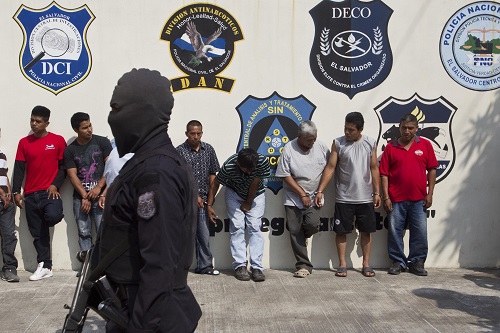AP photo
By
Ricardo Swire
Effective internal security apparatuses shrewdly monitor individual areas of the administrative system to guarantee national security. In democratic countries the Judiciary is regarded as the third branch of government that defends and upholds the Constitution. The Judiciary also guarantees that the rule of law prevails, under general duty and mandate daily function reflects the level of Court or Judge’s jurisdiction. Inescapable elements of a Court’s role are the protection of Constitutional, human, civil and individual rights.
Regionally, El Salvador is the smallest Spanish-speaking mainland state and most heavily populated of seven Central American territories. On Monday August 14, 2017 an internal security team from the Civil National Police (PNC) Elite Division Against Organized Crime (DECO) discovered a lawyer called “Pitinga” was the architect of a network that influenced El Salvador’s judiciary for payola. The Attorney General Office or FGR’s Specialized Crime Unit boss reported key elements of Operation “Transes” which began in 2016.
The year-long probe ascertained how five judicial staff, eight private lawyers, one prosecutor, a former lawyer, an ex-Judge, a Police Sargent and two PNC Agents corrupted El Salvador’s judicial procedures. Pitinga the lawyer, whose office is located in the First Chamber of San Salvador’s Court, directed judicial accomplices to short-circuit El Salvador’s judiciary and create advantages for prosecuted characters. Universally, the Court’s most essential role is protection of one citizen from wrong-doings of another.
In addition the Judiciary’s responsibilities include guarding residents from unwarranted or unlawful exercise of power by the State. A country’s court system also has the vital task of securing domestic tranquility, by providing a structured institutionalized forum for the resolution of discord and dispute. Vindication of civil and criminal offences are included. DECO’s Operation Trances uncovered how fees, ranging from US$50 to US$10,000, were paid to Pitinga’s network to favor defendants with legal benefits.
Evidence confirmed such corruption allowed three sets of criminal gangs to benefit from preferred Court rulings. Pitinga illegally filtered private and confidential judicial information to El Salvador’s ex-President for a US$10,000 fee, while the top politician was the defendant in a civil trial. The newly arrested Peace of San Francisco Menedez ex-Judge and ring-leader Pitinga share similar indictments. Bribes to favor defendants in judicial proceedings were a prominent feature in the San Francisco Menéndez, First Instance Court of Acajutla, First Instance of Izalco and the First Civil Chamber of San Salvador the capital city.
Ricardo Swire
Ricardo Swire is the Principal Consultant at R-L-H Security Consultants & Business Support Services and writes on a number of important issues.



No Comments Yet!
You can be first to comment this post!